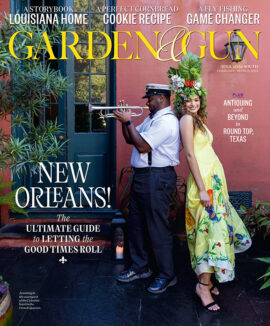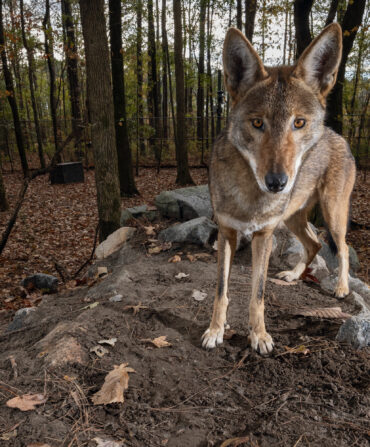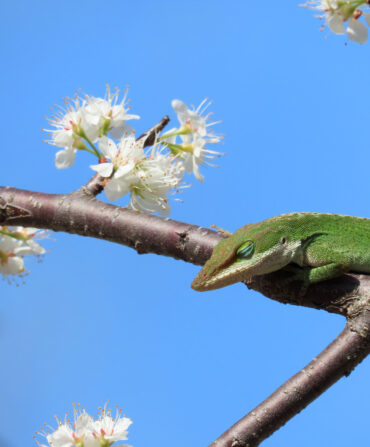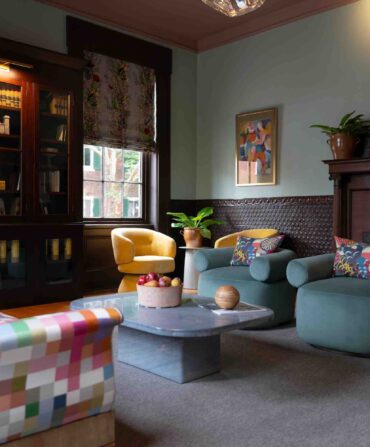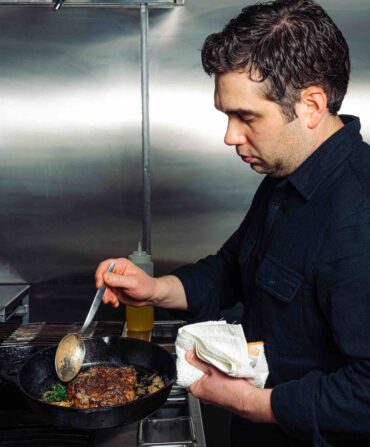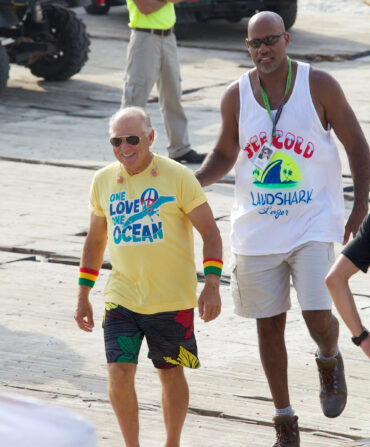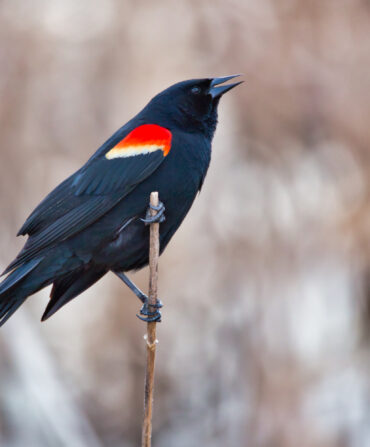Travel
Opulence on the Usk
Big trout, royal quarters, and unforgettable hospitality are on deck at Glanusk Estate
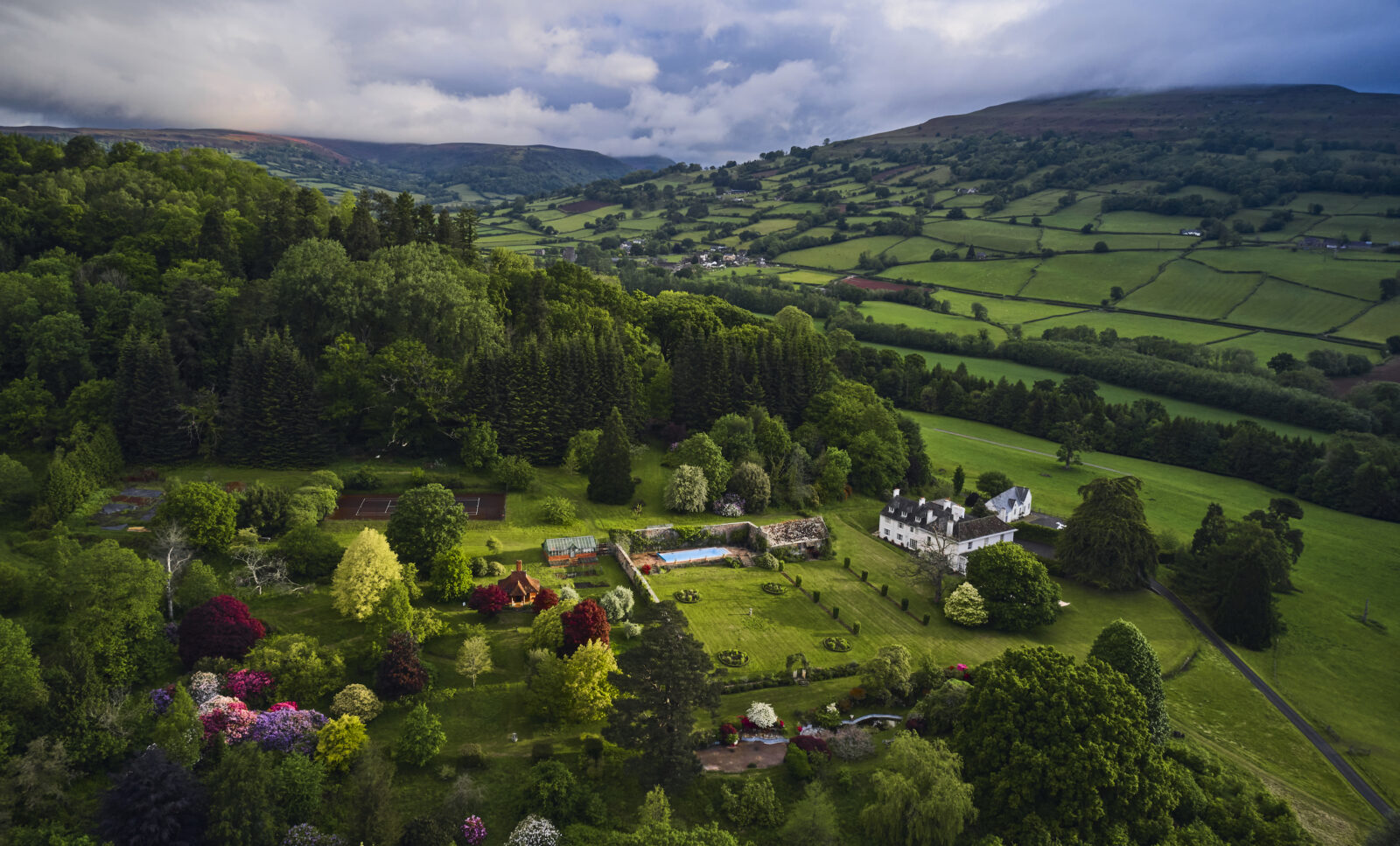
Photo: WILLIAM HEREFORD
A falcon’s-eye view of the main house on Glanusk Estate.
Glanusk Estate in South Wales has been in Harry Legge-Bourke’s family for three years shy of two centuries, and if Harry has anything to do with it, it is not changing hands anytime soon. He will be the first to admit that there may not be as much cash lying around to run the place in the manner to which it is accustomed as there was when his mother’s great-great-grandfather owned and operated one of the largest iron businesses in the world. But like more than a few of Great Britain’s landed gentry, Harry has, for the past fifteen years, helped the estate pay for itself by “doing hospitality.” And for travelers, this is a very good thing indeed, since no one I have ever met does it better than Legge-Bourke, and nowhere I have ever visited is a more pleasant place for the doing of it than Glanusk.
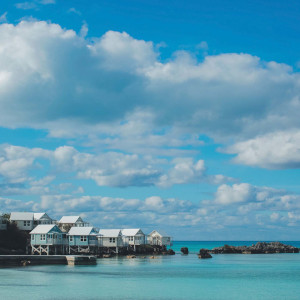
The 16,000-acre estate is located on the River Usk in Brecon Beacons National Park—an area of such languid, soul-soothing beauty that it makes you wonder with Walt Whitman how there could ever be a mean man or an infidel. Fifteen hundred of those acres are given to crops of barley and wheat, and fifteen hundred to the raising of sheep; and some is leased to local farmers whose fields, bordered by hedgerows, climb the misty hillsides in subtly varied shades of green. The balance of the Glanusk acreage is in woodlands, including giant sequoias and a collection of more than two hundred varieties of oaks, whose acorns were collected around the world by Legge-Bourke’s father and planted by the river and above the house by father and son.
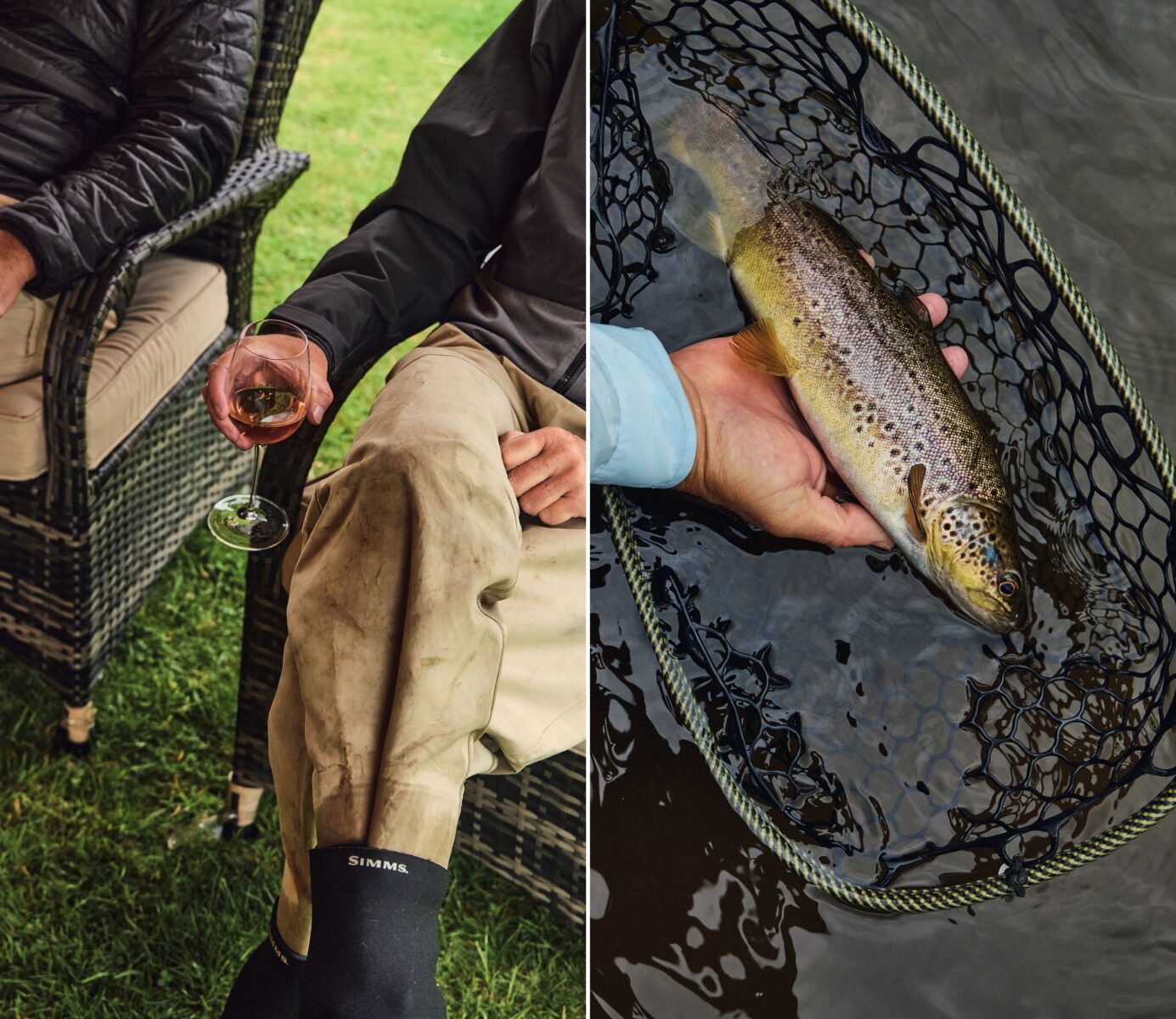
Photo: WILLIAM HEREFORD
Cocktail hour on the river; a wild brown trout comes to the net.
Surrounding that house are gardens and parkland, a lovely private stone chapel built in 1830, barns, greenhouses, a tennis court and pool—all the accoutrements of upper-class British country life. And at a decorous remove from the house and its grounds are a few of Legge-Bourke’s accommodations to the doing of hospitality: a caravan park, rental cottages, and, hard by the river, a piece of land he rents out to film crews.
The greatest of those accommodations is the house itself, which Legge-Bourke has buoyantly opened to paying guests, and where I and a group of friends were graced to stay over four days and nights. Like the grounds and its owner, the large Georgian house sprawls with an unfussy elegance. It sleeps up to twenty guests in bedrooms that have rested, among other worthies, various members of the royal family. Throughout its high-ceilinged gathering rooms are fine paintings, Oriental rugs, framed tapestries, military helmets, commemorative swords, old silver. In the drawing room, the mandatory backgammon table. In the hallway, two huge brass umbrella stands holding walking sticks, cricket bats, and over a dozen regimental scabbarded swords. On the tables and walls, photos of Legge-Bourke with his family, with the queen, of himself with five previous generations of little boy ancestors in their Page to the Queen uniforms, miniature swords at their sides. There are inviting fireplaces in the two drawing rooms and in the dining room, whose glass doors open onto hedges of rhododendron.
If all this sounds to you perhaps a bit too “done,” believe me, it is not. We were a group from Alabama and Kentucky with dirt between our toes, and it felt to us, as it would to you…just right. It is made to feel that way by Legge-Bourke. At a vigorous fifty-one, he is a big, dapper, enthusiastic man, curious and intelligent, with a commanding voice and grin. As charmingly relaxed and unstudied as his house, he seems to love the fact that you are there in it—tracking perhaps some of that Alabama dirt onto his carpets, fingering the family silver, announcing at dinner that, sorry, you don’t eat venison. In short, this upper-crust Brit, an eighth-generation military man, possesses the elusive secret to true hospitality: He enjoys providing it.
“So, what is the schedule here, Harry?” I asked him shortly after we arrived. Some of our group of twelve had come to fish the Usk, others to sightsee, and a few to do both: rather a large order of organization, but Harry was not fazed.
“Oh, we don’t really have schedules here,” he said. “We prefer everyone just do as they like.”
It seemed a little loose to me, one who thrives on organization; but it turned out, again, just right. In happy contrast to the Prussian daily regimens of angling lodges everywhere, good local fishing guides showed up each day whenever and for however long the anglers to whom they were assigned wanted them. And those anglers found much to enjoy on the Usk.
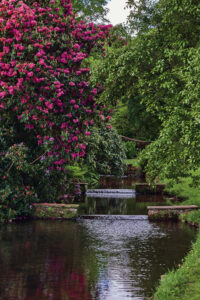
Photo: WILLIAM HEREFORD
Rhododendrons in full bloom in the gardens at Llanover.
Celebrated for centuries as one of the finest fishing rivers in the United Kingdom, the Usk holds Atlantic salmon, sea-run trout, and resident wild brown trout in its seventy-five miles from headwaters in the Brecon Beacons highlands to where it meets the sea at the Severn Estuary. Glanusk owns five of those miles, on both banks and divided into five beats. The water in those beats is tannin stained, the color of strong English tea, and divides itself fetchingly among long, smooth pools, riffles, and small rapids, all of them very low when we visited, making the fishing for the Usk’s famously diffident native browns even more challenging than usual. We had to work for our fish, with nymphs and finesse the order of the day, but the ones we caught were fat and feisty, and the beats were sylvan gems.
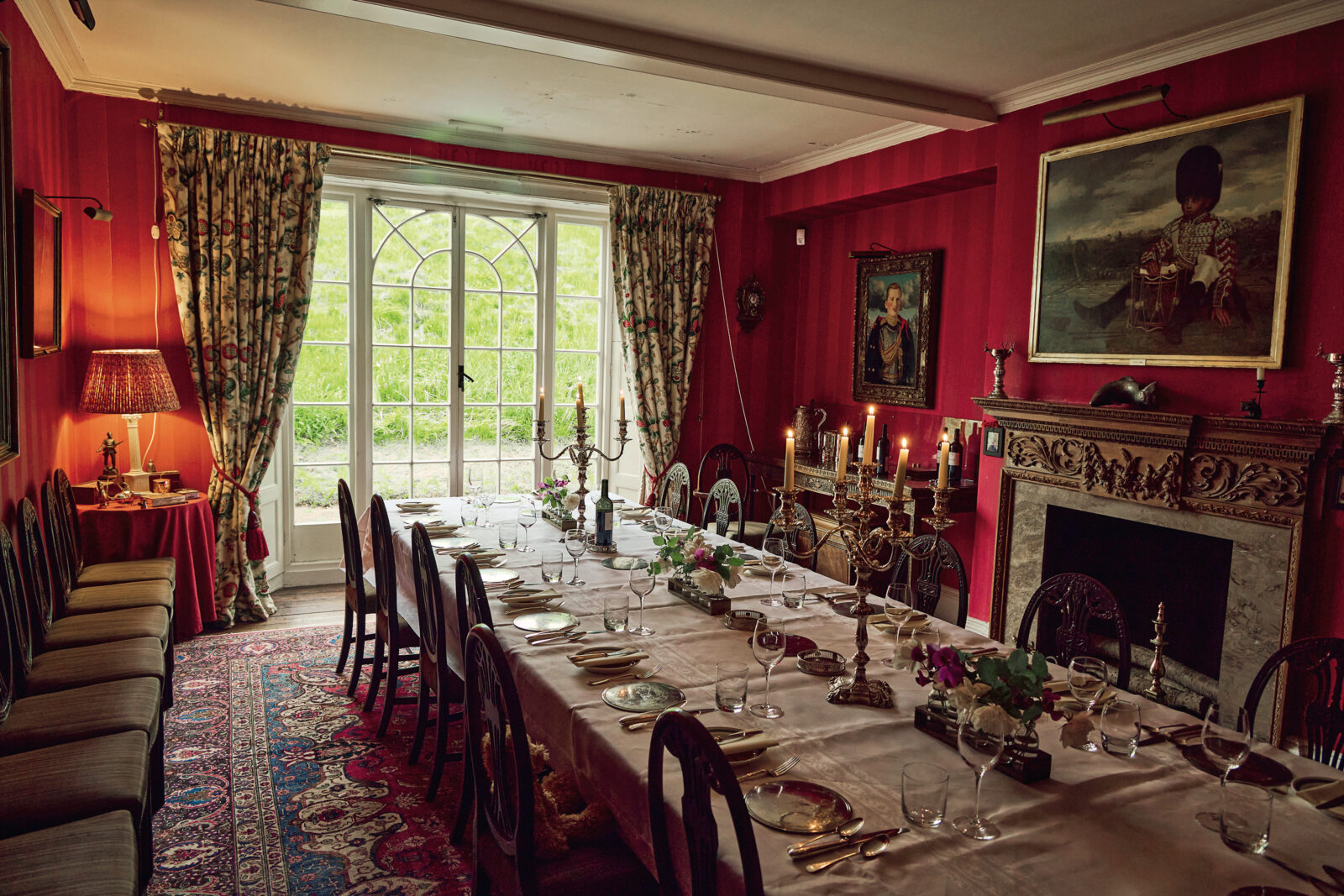
Photo: WILLIAM HEREFORD
The dining room awaits a throng of hungry guests.
As Legge-Bourke had promised, we fished whenever and as long as we wished during the day, breaking if we liked (and I did) for sumptuous alfresco lunches, maybe for a postprandial nap, and certainly for the proper English tea served at five and starring delicious little cupcakes with the Union Jack scrolled in frosting. Cocktail hour? Oh, about seven, unless you wanted to fish the evening rise. And the Lucullan candlelit dinners featuring fresh sea bass, young local chickens, Harry’s lamb, and excellent wines? Well, somewhere in the neighborhood of eight or nine.
Breakfast, predictably, was whenever you wanted it. And then, for those of us who didn’t fish and those like me who wanted to combine fishing with seeing something of the countryside, Legge-Bourke would serve up each morning, rather like a tray of assorted marmalades and jams for your breakfast muffin, a bevy of enticing options for the day.
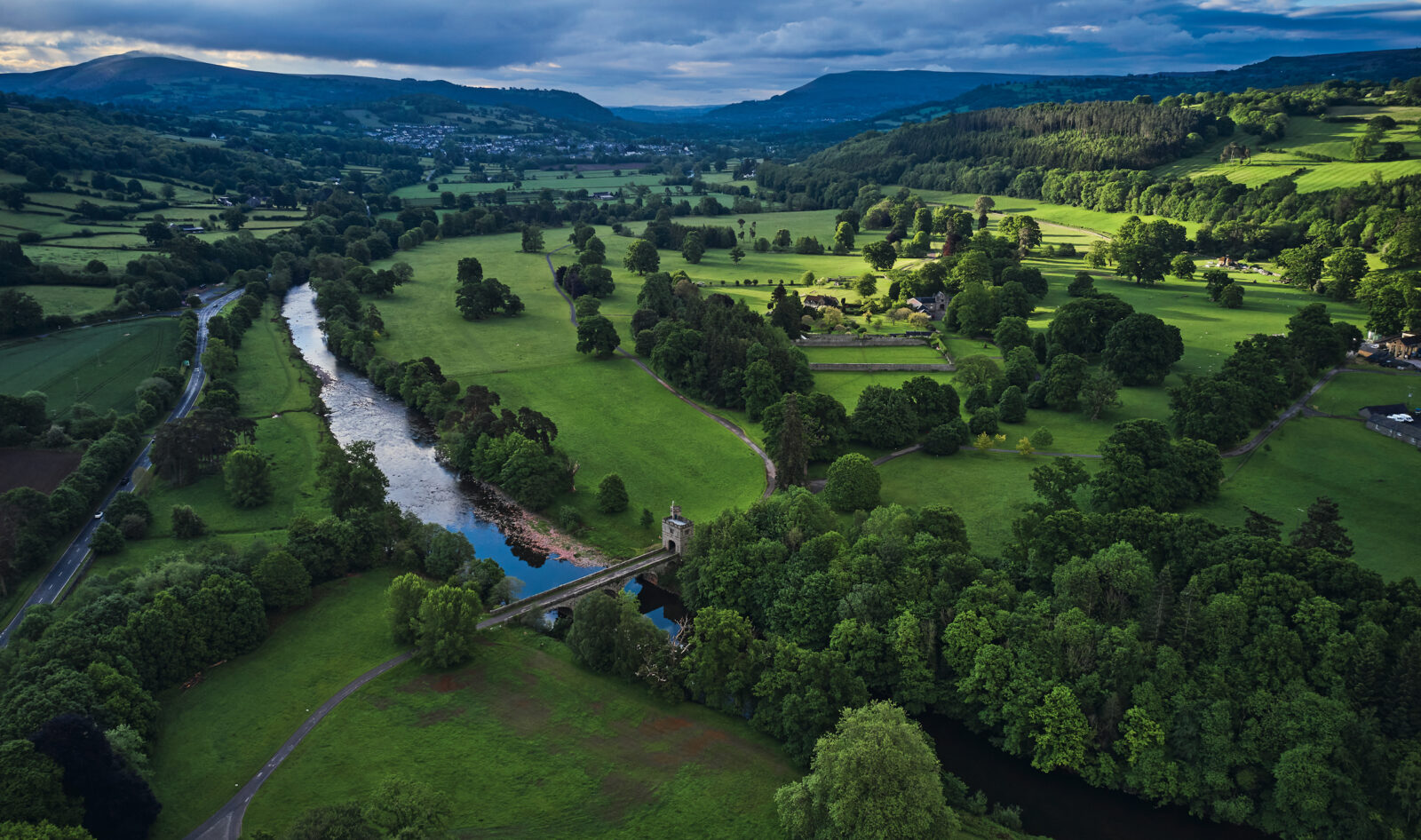
Photo: WILLIAM HEREFORD
A view of the River Usk running through Glanusk Estate.
In the mood for a garden? Well, just down the road is Llanover, one of the finest in Wales, a beautifully modulated hysteria of blooming opulence. And after lunch, how about a guided tour through Tretower Court and Castle—its keep built around 1100, in 1415 the gathering place for Welsh archers to march on the French for the Battle of Agincourt, and now an assemblage of ancient stone buildings, garden, orchard, and courtyard—by whose yawning kitchen fireplace I yearned to put my feet up, drink some mead, and roast a pig while my archers practiced outside.
You can also spend an entire and very enjoyable day as some of us did in the town of Crickhowell, a ten-minute drive from Glanusk (closer to five if Legge-Bourke is driving). Dating back to the twelfth century, with its lovely views of the Usk, its dozens of art and craft studios, and its Georgian high street of good shops, it is a true joy to dally in. Moreover, Crickhowell is home to the Bear. I am an aficionado of British pubs, and the Bear is the best I have ever had a pint pulled in. Having welcomed guests for five hundred years, it has gotten good enough at that to be twice named Best Pub in Britain, no mean feat in a place where pubs are as ubiquitous and routinely excellent as bistros are in France. We lunched there for over two hours, and it was not long enough.
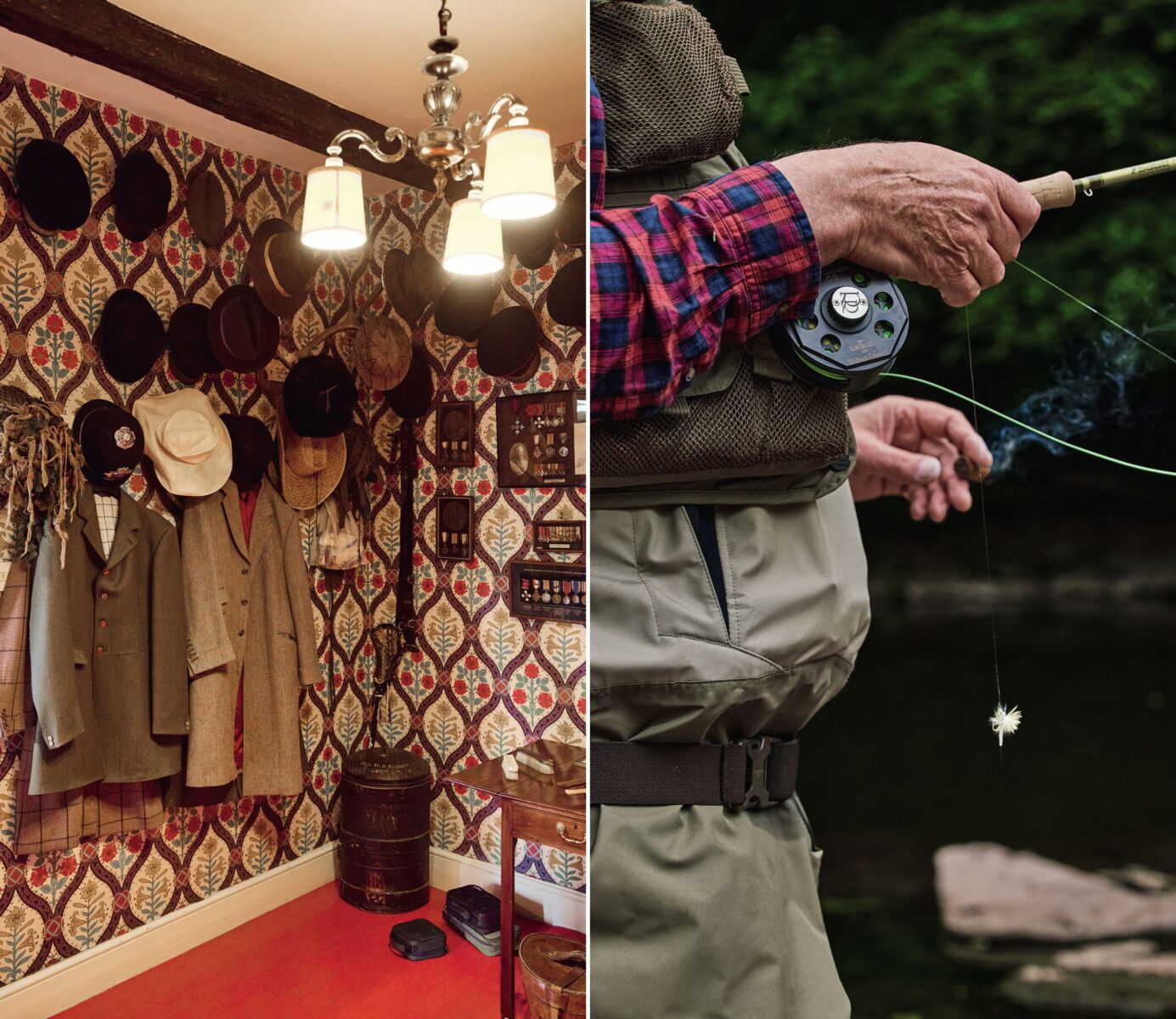
Photo: WILLIAM HEREFORD
The cloakroom at Glanusk; a fly fisherman enjoys the evening bite and a fine cigar.
If your tastes in recreation run to things more strenuous than visiting gardens, castles, art studios, and pubs, Legge-Bourke can hook you up there as well. The 520-square-mile Brecon Beacons National Park in which Glanusk resides offers world-class hiking and trekking, along with kayaking, rafting, sailing, paragliding, and rock climbing. If you would prefer to climb on a horse rather than rocks, you can ride over miles of trails in the park’s green hills without seeing another soul. And if your idea of how to cap off a good day is to sit outside gazing at the heavens, the park is an International Dark Sky Reserve.
Have I mentioned that, as another wile for keeping Glanusk together in all its present glory, Legge-Bourke makes and sells his own gin?
I have already used too many superlatives in this story, but allow me one more: I am a gin man, and I have never sipped a better one than Legge-Bourke’s. Sipping is the correct thing to do with this gin, preferably neat and from a Waterford highball glass. It is called Glanusk Oak Mellowed Gin because it is made from juniper and other botanicals found in the Black Mountains and then filtered through shavings of Legge-Bourke’s oaks to give it flavor and color. It has something of the Usk’s tint and is at the same time dry and richly pungent on the tongue.

Edward VIII, then Prince of Wales, and his shooting party at Glanusk, circa 1929.
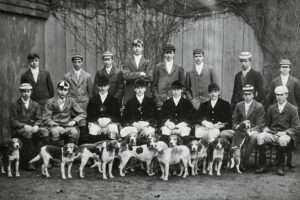
Harry Legge-Bourke’s grandfather (top middle) with Eton beagles, circa 1912.
Holding a generous after-dinner glass of it in the drawing room at Glanusk on our last night—while a fierce game of backgammon raged ten feet away, to which my beverage made me serenely oblivious—I said something like the following to our host:
“You know, Harry, one of the consolations of old age is that your aims narrow.” A wise nod of my gray head, another sip of gin. “I have always been a shotgun in my travels, but now I am a sniper’s rifle. Of the countless places I have been, there are fewer than a half dozen I would return to. Glanusk is one of them.”

